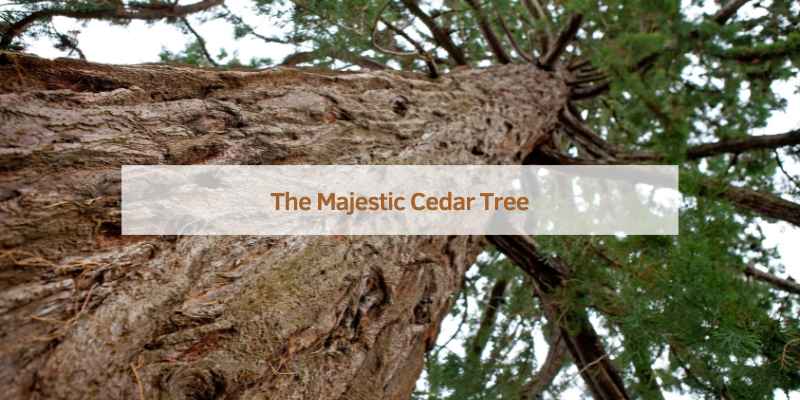The meaning of Cedar Tree symbolizes strength, endurance, and eternity in various cultures worldwide. Ancient civilizations like the Egyptians used cedar resin for mummification, highlighting its association with immortality.
Cedar wood is also linked to longevity, protection, and nobility due to its characteristics. In Lebanon, the cedar tree holds significant cultural value as a symbol of strength and endurance through historical challenges. Additionally, the evergreen nature of cedar trees signifies resilience, purity, and spiritual health.
The aroma of cedar wood is believed to have medicinal properties, contributing to its special meaning in promoting physical well-being. Through its enduring presence and symbolic significance, the cedar tree continues to inspire strength and immortality across different traditions and beliefs.
The Majestic Cedar Tree
The Cedar tree, known for its majestic presence and enduring symbolism, holds a special place in various cultures and landscapes around the world. Standing tall and proud, the Cedar tree embodies strength, longevity, and nobility, making it a revered symbol of greatness and incorruptibility.
Cedar’s Botanical Profile
The Cedar tree is characterized by its tall, wide, evergreen stature, exuding a sweet fragrance that sets it apart from other trees. The wood of the Cedar tree is often used for its durability and aromatic properties, making it a popular choice for furniture, chests, and decorative items.
Cedar’s Historical Significance
Throughout history, the Cedar tree has held immense cultural and spiritual significance. Ancient civilizations, such as the Egyptians, valued Cedar resin for its preservation properties, using it in mummification rituals to symbolize eternal life and immortality.

Cedar Symbolism In Ancient Civilizations
Cedar tree has held significant meaning in various ancient civilizations. It is a symbol of strength, endurance, and immortality. Cedar resin was even used by Egyptians to mummify their dead.
Egyptian Mummification Rituals
In ancient Egypt, cedar trees held great significance in the process of mummification. The Egyptians believed that cedar resin possessed powerful preservative properties, making it an essential ingredient in their embalming rituals. The resin, extracted from the cedar tree, was used to preserve the bodies of the deceased, ensuring their immortality in the afterlife.
During the mummification process, the body of the deceased was carefully cleansed and organs were removed. The body was then packed with various substances, including cedar resin, to prevent decay. The resin acted as a natural preservative, aiding in the desiccation and preservation of the body.
The Egyptians associated the cedar tree with eternal life and believed that its use in mummification rituals ensured the deceased would have a successful journey into the afterlife. The strong, aromatic scent of cedar also played a role in these rituals, symbolizing purification and protection.
Cedar In Myths And Legends
Beyond its role in Egyptian mummification, cedar trees have been revered in myths and legends across various ancient civilizations. These trees were often associated with strength, endurance, and immortality.
In Greek mythology, the cedar tree was believed to be sacred to the goddess Artemis. It was said that the goddess would transform her followers into cedar trees to protect them from harm. The cedar tree was seen as a symbol of protection and divine grace.
In Mesopotamian mythology, the cedar tree was regarded as a sacred tree of the gods. It was believed to be the abode of the gods and a bridge between heaven and earth. The cedar’s towering height and longevity represented its connection to the divine realm.
Throughout history, the cedar tree has been seen as a symbol of strength, endurance, and immortality in various cultures and civilizations. Its significance in ancient rituals and myths highlights its enduring symbolism and the deep-rooted cultural importance it holds.
Cultural Emblems
The cedar tree has been revered and celebrated as a cultural emblem in various traditions and societies around the world. Its symbolism and significance have been deeply ingrained in the collective consciousness of different cultures, representing strength, resilience, and spiritual power.
Cedar Of Lebanon: National Symbol
In Lebanon, the cedar tree holds a special place as a national symbol, representing strength and endurance. Poets and artists have depicted the cedar tree as a timeless symbol of strength and eternity, reflecting its ability to withstand tumultuous periods of history.
Cedar In Native American Traditions
Native American traditions also venerate the cedar tree for its spiritual significance. The evergreen branches, particularly cedar, are utilized in winter holiday decorations to symbolize the renewal of life and the return of spring. Additionally, the cedar tree is associated with the concept of “divine wood,” reflecting its sacred and revered status in Native American cultures.
Spiritual And Religious Connotations
The cedar tree holds significant spiritual and religious connotations across various cultures and belief systems. It is revered for its symbolism of strength, endurance, and protection, making it a prominent fixture in religious texts and spiritual practices.
Biblical References To Cedar
In the Bible, cedar is frequently mentioned as a symbol of strength, stability, and abundance. The majestic cedar trees were used in the construction of temples, including the renowned Temple of Solomon. The imagery of the cedar tree is often associated with divine blessings and prosperity, signifying its spiritual importance in biblical narratives.
Cedar In Spiritual Practices
Across spiritual traditions, cedar is utilized for its purifying and healing properties. It is commonly burned as incense or utilized in sacred rituals to cleanse spaces and individuals from negative energies. The aromatic essence of cedar is believed to facilitate spiritual clarity and renewal, making it a revered element in various spiritual practices and ceremonies.
Symbolism Of Strength And Endurance
The cedar tree holds a profound symbolic meaning of strength and endurance. It represents resilience and the ability to withstand challenges.
Cedar’s Resilience In Nature
In nature, the cedar tree showcases remarkable resilience. It thrives in harsh conditions, standing tall even in the face of adversity.
Metaphorical Use In Literature
In literature, the cedar tree is often used as a metaphor for strength and endurance. Poets and writers depict it as a symbol of unwavering fortitude and longevity.
Life, Immortality, And Health
The cedar tree symbolizes endurance, eternal life, and immortality. Ancient civilizations, like the Egyptians, used cedar resin for mummification. In Lebanon, it represents strength and cultural significance. Cedar wood is associated with longevity, protection, and spiritual health, making it a versatile symbol in various contexts.
Cedar’s Evergreen Quality
Cedar trees are known for their evergreen quality, which represents life, endurance, and immortality. The tree’s ability to stay green throughout the year, even in harsh conditions, has made it a symbol of strength and resilience. Cedar trees are also associated with growth and renewal, as they shed their old needles every year and grow new ones.
Medicinal Uses Of Cedar
Cedar trees have been used for medicinal purposes for centuries. The tree’s essential oil is known for its antiseptic, antifungal, and anti-inflammatory properties. Cedar oil is commonly used to treat skin conditions such as acne, eczema, and psoriasis. It is also used to relieve respiratory problems such as coughs, colds, and bronchitis. Cedar wood is used in aromatherapy to promote relaxation and reduce stress.
Cedar wood is also known for its insect-repelling properties. The wood contains natural compounds that repel insects such as moths, mosquitoes, and ants. Cedar wood is often used to make hangers and storage chests for clothes to protect them from insects.
In Native American cultures, cedar leaves and bark were used to make teas and infusions to treat various ailments such as headaches, fever, and colds. Cedar was also used in sweat lodges for its purifying and cleansing properties.
Overall, cedar trees have a rich history and symbolism in various cultures. From representing strength and endurance to promoting health and wellness, cedar trees are a valuable and meaningful part of our natural world.
Cedar In Modern Symbolism
The cedar tree holds great significance in modern symbolism, representing strength, endurance, and immortality. It is often associated with eternal life and is used in various cultures to symbolize resilience and longevity. Additionally, the cedar tree is believed to have spiritual properties, helping to revitalize the body and guard against illness.
The cedar tree holds significant symbolism in modern times, representing endurance, eternal life, and strength. It is often associated with nobility, greatness, and incorruptibility, making it a revered symbol in various aspects of contemporary society.
Cedar In Contemporary Art
In the realm of contemporary art, the cedar tree is frequently depicted to symbolize resilience and timeless beauty. Artists use its imagery to convey themes of strength, endurance, and the cyclical nature of life. The cedar’s significance as a symbol of longevity and steadfastness is often reflected in modern artistic expressions.
Cedar’s Role In Environmental Conservation
Amidst the growing concern for environmental conservation, the cedar tree has emerged as a poignant emblem of sustainability and preservation. Its portrayal in contemporary art often serves as a reminder of the importance of safeguarding natural resources and fostering ecological balance. By highlighting the cedar’s role in environmental conservation, artists and conservationists aim to inspire a deeper appreciation for nature and a commitment to protecting our planet’s precious ecosystems.
Cedar Tree Folklore And Magic
The Cedar tree has been steeped in folklore and magic for centuries, revered for its protective qualities and associated with various rituals and charms. From its protective qualities to its significance in rituals and charms, the Cedar tree holds a special place in folklore and magic.
Protective Qualities Of Cedar Wood
The wood of the Cedar tree is highly valued for its protective qualities. It is believed to ward off negative energy and evil spirits, making it a popular choice for crafting talismans and amulets. The aroma of Cedar wood is also thought to purify the air and create a sense of calm and security. Due to these protective properties, Cedar wood has been used in various cultures as a symbol of strength and resilience.
Cedar In Rituals And Charms
Cedar plays a significant role in rituals and charms across different cultures. It is often used in purification rituals to cleanse spaces of negative energy and promote spiritual healing. The branches and leaves of the Cedar tree are also utilized in crafting protective charms and sachets, believed to bring good fortune and protection to those who possess them. Additionally, Cedar is incorporated into spiritual ceremonies to symbolize renewal and the cyclical nature of life.

Frequently Asked Questions
What Does A Cedar Tree Symbolize?
The cedar tree symbolizes endurance, strength, and eternal life, with a rich history in ancient civilizations.
What Does A Cedar Tree Stand For?
The cedar tree symbolizes strength, endurance, and eternity. It is associated with resilience, purity, and spiritual protection. Ancient civilizations, such as the Egyptians, used cedar resin in mummification. Cedar wood is also believed to have medicinal properties and is used for its aroma in various rituals and practices.
What Is The Spiritual Purpose Of Cedar?
The spiritual purpose of cedar is to enhance clairvoyance, rejuvenate the body, mind, and spirit, and offer protection against illnesses. Cedar is linked to longevity, protection, and is used in charms for these purposes.
What Is The Meaning Of Cedar?
Cedar is a type of tall, evergreen tree known for its sweet-smelling wood. It symbolizes strength, endurance, and eternal life. Ancient civilizations, like the Egyptians, even used cedar resin to mummify their dead. Cedar wood is also associated with longevity, protection, and spiritual health.
It is believed to have medicinal properties and is used in charms for various purposes.
Conclusion
The cedar tree holds significant cultural and spiritual symbolism across various civilizations. Its endurance and everlasting nature make it a symbol of strength, immortality, and protection. Cedar wood’s aroma is also believed to have medicinal properties, promoting physical health. The tree’s association with purity, resilience, and spiritual protection adds to its spiritual significance.
From ancient Egyptians to modern-day winter holiday decorations, the cedar tree continues to hold a special place in our hearts and minds.


